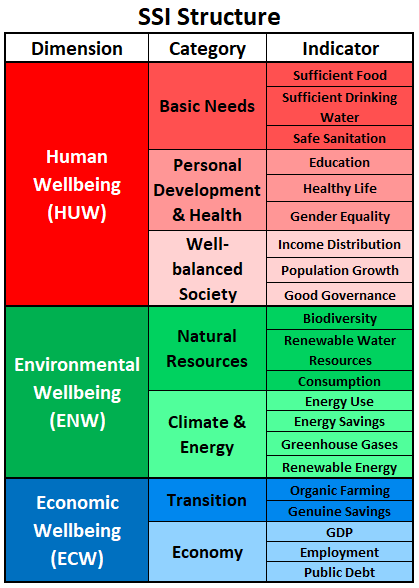SSI - Sustainable Society Index
Your compass to sustainability
Your compass to sustainability
The Sustainable Societies Index (SSI) is a ranking system that assesses the sustainability of countries based on social, environmental, and economic factors. The SSI serves as a tool for policymakers, businesses, and citizens to identify areas for improvement and take action towards a more sustainable future.
Since 2020 SSI is hosted at TH Köln’s Schmalenbach School of Business, Economics and Law.
|
|
|
Relevance
The SSI is enlisted in EU’s COIN list. Besides the SSI, this list contains only a very few other index systems covering all three sustainability pillars at once, e.g. SDG Index, the Transition Performance Index (TPI), and the Global Sustainable Competitiveness Index (GSCI). In comparison to SSI, GSCI is orientated towards the competitiveness of the economy; TPI concentrates on developments. In contrast to these three index systems, the SSI delivers time series abilities back to the year 2000 and covers the most extensive list of countries.
Structure of the SSI
The SSI shows at a glance the level of sustainability of countries along three dimensions:
- Human wellbeing (HUW)
- Environmental wellbeing (ENW)
- Economic wellbeing (ECW)
The SSI is structured along the lines of the Triple Bottom Line of social (HUW), environmental (ENW) and economic (ECW) sustainability. HUW consists of three categories based on nine indicators. ENW consists of two categories based on seven indicators. Finally, ECW consists of two categories based on five indicators. All scores are given on a sustainability scale of 1 (weakest) to 10 (strongest). There is no overall sustainability score combining the three dimensions.

Project history
Development of the SSI started in the early 2000s. Data providers discontinued their service or updated their data over the years. A data update became necessary. Data of smaller countries became available and were expected to be included into the SSI. The need for time series capability grew rapidly. With version 2 of the SSI we meet all these requirements.
Although the perception of sustainability changed slightly since the start of the development of the SSI, we haven't changed the alignment of the indicators yet. This will be part of version 3, planned for the closer future.
From SSI 2018 onwards (i.e. year 2020), SSI editions are hosted by TH Köln under the supervision of professors at TH Köln’s Schmalenbach School of Business, Economics and Law.
In 2022 SSI versions V2 was published. It delivers time series abilities for data since SSI 2000 on a yearly basis for all countries listed at world bank. At the same time the key advantages of SSI, i.e., its clear focus and ease of use is preserved. Since then new editions will always deliver time series abilities.
As for future editions of the SSI we are working on a renewal of some of the indicators while adding indicators for deeper societal and economic analyses. Nevertheless, time series ability will be preserved anyway.
Related literature
- Fuchs, D., Schlipphak, B., Treib, O., Le Long, A. N., & Lederer, M. (2020). Which Way Forward in Measuring the Quality of Life? A Critical Analysis of Sustainability and Well-Being Indicator Sets. Global Environmental Politics, 20(2), 12–36. https://doi.org/10.1162/glep_a_00554
- Kowalski, S., Veit, W. (2020). 2018 Summary Report. https://doi.org/10.13140/RG.2.2.24022.06721/1
- Luukkanen, J.,Kaivo-oja, J.,Vähäkari, N., T. O’Mahony, T., Korkeakoski, M., Panula-Ontto, J., Phonhalath, K., Nanthavong, K., Reincke, K., Vehmas, J., & Hogarth, N. (2019). Green economic development in Lao PDR: A sustainability window analysis of Green Growth Productivity and the Efficiency Gap. Journal of Cleaner Production(211), 818-829. https://doi.org/10.1016/j.jclepro.2018.11.149
- Ding, Y., Fu, Y., Lai, K. K., & John Leung, W. K. (2018). Using Ranked Weights and Acceptability Analysis to Construct Composite Indicators: A Case Study of Regional Sustainable Society Index. Social Indicators Research, 139(3), 871–885. https://doi.org/10.1007/s11205-017-1765-3
- Kowalski, S., Veit, W. (2018). "Aligning Sustainability and Competitiveness in International Supply Chains: A Consumer Driven Approach," L'industria, Società editrice il Mulino, issue 4, pages 583-614.
- Wu, S., Fu, Y., Shen, H., & Liu, F. (2018). Using ranked weights and Shannon entropy to modify regional sustainable society index. Sustainable Cities and Society, 41, 443–448. https://doi.org/10.1016/j.scs.2018.05.052
- Savić, D., Jeremić, V., & Petrović, N. (2016). Rebuilding the Pillars of Sustainable Society Index: a Multivariate Post Hoc I-distance Approach. PROBLEMY EKOROZWOJU – PROBLEMS OF SUSTAINABLE DEVELOPMENT, 12(1), 125–134. Retrieved from https://ssrn.com/abstract=2856356
- Gallego-Álvarez, I., Galindo-Villardón, M. P., & Rodríguez-Rosa, M. (2015). Analysis of the Sustainable Society Index Worldwide: A Study from the Biplot Perspective. Social Indicators Research, 120(1), 29–65. https://doi.org/10.1007/s11205-014-0579-9
- Kaivo-oja, J., Panula-Ontto, J., Vehmas, J., & Luukkanen, J. (2013). Relationships of the dimensions of sustainability as measured by the sustainable society index framework. International Journal of Sustainable Development & World Ecology, 21(1), 39–45. https://doi.org/10.1080/13504509.2013.860056
- Saisana, M., & Philippas, D. (2012). Sustainable society index (SSI): Taking societies' pulse along social, environmental and economic issues. EUR (Luxembourg. Online): Vol. 25578. Luxembourg: Publications Office.
- Van de Kerk, G., & Manuel, A. R. (2008). A comprehensive index for a sustainable society: The SSI — the Sustainable Society Index. Ecological Economics, 66(2-3), 228–242. https://doi.org/10.1016/j.ecolecon.2008.01.029
Contact us
We welcome all parties interested in analysing, discussing, and developing solutions for global sustainability to join us in our endeavours. We will be happy to share our insights with you and learn from your experiences.
You can reach us via info.ssi@f04.th-koeln.de. Please leave us your name and associated institution.



